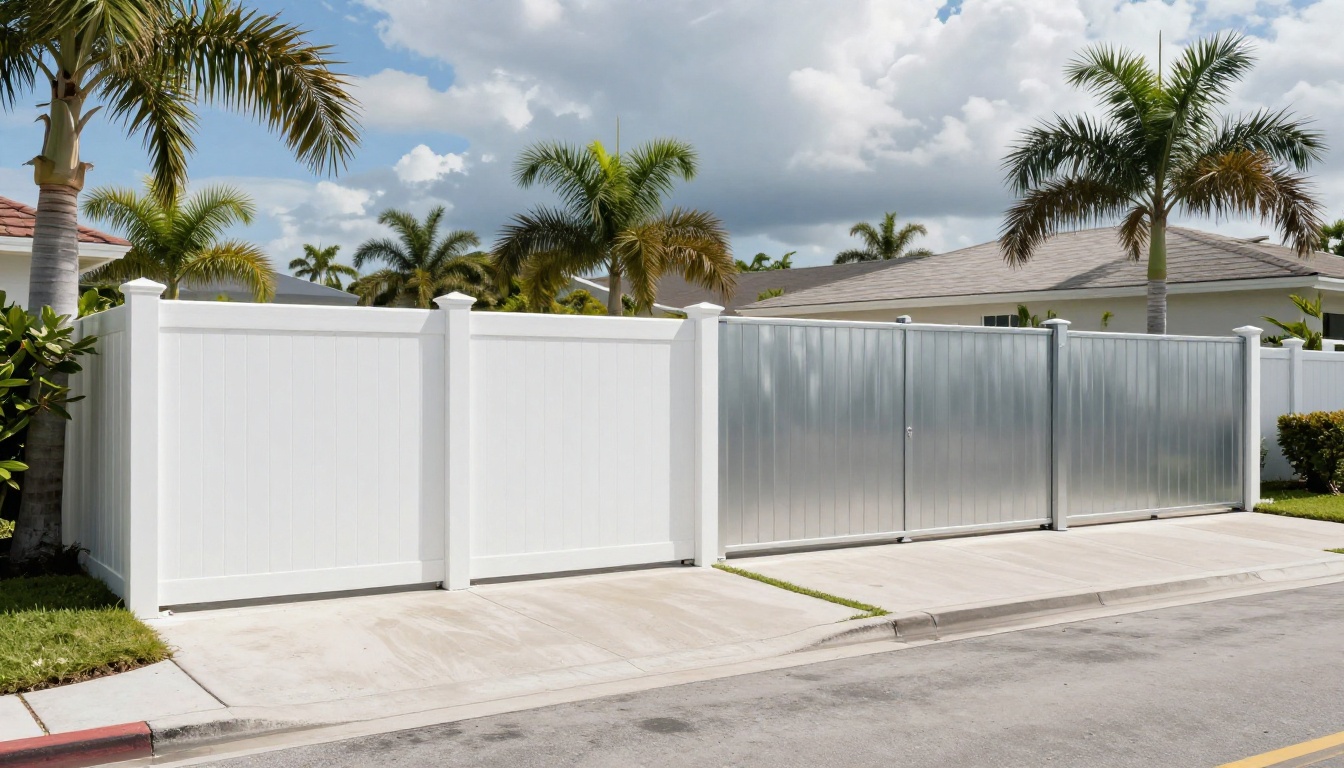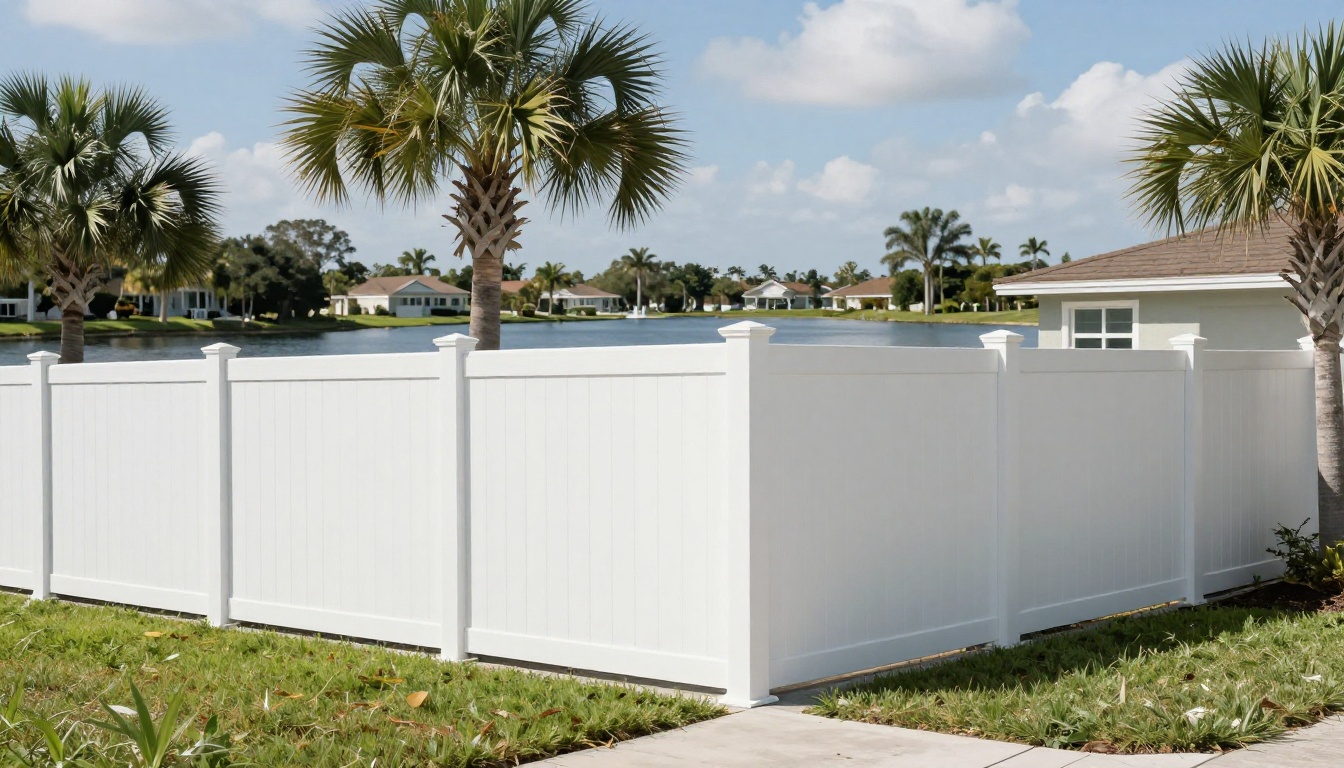July 23, 2025
Choosing the Best Wood for Your Fence in Cape Coral's Climate
Understanding Cape Coral’s Climate and Its Impact on Fencing Materials
Cape Coral, Florida, is known for its tropical climate, characterized by hot temperatures, high humidity, intense summer heat, and significant rainfall. The area experiences annual temperatures ranging from the mid-60s in winter to the upper 90s in summer, with humidity levels often exceeding 70%. Rainfall is abundant, especially during the wet season from June to September, and hurricanes are a recurring threat. These weather patterns create unique challenges for outdoor structures like fences, which must withstand prolonged exposure to moisture, heat, and wind.
The combination of moisture, UV exposure, and storm risks can take a toll on wood fences. High humidity accelerates rot and mold growth, while intense sunlight can cause fading and warping. Hurricanes bring strong winds that may damage poorly installed or weak fences. Understanding these factors is essential when selecting materials that can endure Cape Coral's demanding environment, ensuring your fence remains functional and attractive for years to come.
Why Wood Remains a Popular Fencing Choice in Cape Coral
Despite the challenges posed by the local climate, wood remains a top choice for fencing in Cape Coral due to its timeless appeal and versatility. Wood fences offer a natural, warm aesthetic that complements both modern and traditional homes. They provide excellent privacy and can be customized in terms of height, design, and finish, making them suitable for a wide range of property styles and homeowner preferences.
Many homeowners in Cape Coral gravitate toward wood because it balances beauty and functionality. While other materials like vinyl or metal have gained popularity, wood continues to hold its ground due to its ability to blend seamlessly with the lush, tropical landscapes typical of the region. For those seeking a durable yet customizable option, companies like Royal Fence Inc. specialize in crafting wood fences tailored to withstand Cape Coral’s unique conditions.
Key Factors to Consider When Choosing Wood for Your Fence
When selecting wood for your fence, several critical factors come into play. First and foremost is climate compatibility—wood must resist rot, insects, and moisture to thrive in Cape Coral's humid environment. Durability is equally important, as frequent storms and high winds demand sturdy materials. Homeowners should also weigh ongoing maintenance requirements, as some woods need more care than others to maintain their appearance and structural integrity.
Budget constraints and material availability are practical considerations that influence decision-making. Certain premium woods may offer superior longevity but come at a higher cost. Additionally, appearance plays a role, as the fence should enhance your property’s curb appeal. Finally, always check local building codes to ensure compliance with regulations regarding fence height, placement, and materials.
Top Wood Species for Fence Durability in Humid and Storm-Prone Climates
Pressure-treated pine is one of the most popular choices for fences in humid climates like Cape Coral. This affordable option undergoes a chemical treatment process that enhances its resistance to rot, termites, and fungal decay. While pressure-treated pine is durable and widely available, it requires regular maintenance to prevent issues such as warping and splitting over time.
Cedar is another excellent choice, prized for its natural resistance to rot and insects. Its aromatic oils act as a deterrent to pests, and its tight grain makes it less prone to cracking. Cedar also boasts an attractive reddish-brown hue that fades gracefully to a silvery gray if left untreated. Variants like Western Red Cedar are particularly well-suited for coastal areas due to their exceptional durability.
Cypress and redwood round out the list of premium options for wood fences. Cypress contains natural oils that make it resistant to moisture and decay, while redwood is celebrated for its strength and rich color. Both species are highly durable but tend to be more expensive than other options. Homeowners seeking long-lasting, low-maintenance solutions often turn to these woods despite their higher upfront costs.
Pressure-Treated Wood: The Pros, Cons, and Best Uses in Cape Coral
Pressure-treated wood excels in environments like Cape Coral, where moisture and insect activity pose significant threats. The chemical treatments used on this type of wood create a barrier against rot and termites, extending its lifespan significantly. It performs exceptionally well when used for posts and structural components that require extra strength and resilience.
However, there are downsides to consider. Pressure-treated wood can release chemicals harmful to the environment if not handled properly. Maintenance is also crucial, as improper sealing can lead to warping, splitting, or premature wear. Homeowners must weigh these drawbacks against the affordability and widespread availability of this material when planning their fence projects.
Cedar, Cypress, and Redwood: Premium Wood Fence Options for Longevity
Cedar stands out for its ability to withstand humidity and resist decay naturally. Its lightweight nature makes installation easier, and its smooth texture allows for easy staining or sealing. Regular maintenance helps preserve cedar’s natural beauty and ensures it remains resistant to the elements over time.
Cypress offers similar benefits, thanks to its natural oils that repel water and insects. While slightly less common than cedar, cypress is readily available in Florida and provides excellent value for its price. Its durability and moderate cost make it a smart choice for homeowners looking for quality without breaking the bank.
Redwood is the epitome of luxury in wood fencing, offering unmatched durability and stunning aesthetics. Its deep red tones and fine grain create a sophisticated look that enhances any property. However, redwood comes with a premium price tag, making it best suited for high-end applications where longevity and visual appeal are top priorities.
Wood Treatment, Stains, and Sealants: Protecting Your Fence from Florida’s Elements
Protective treatments, stains, and sealants are essential for maximizing the lifespan of wood fences in Cape Coral. These products shield the wood from UV rays, moisture, and temperature fluctuations, preventing damage such as cracking, fading, and rot. Applying a quality sealant every few years can dramatically extend the life of your fence while maintaining its appearance.
To keep your fence in top condition, establish a routine maintenance schedule. Inspect your fence regularly for signs of wear, such as discoloration, peeling, or warping. If you notice these issues, it’s time to reapply sealant or perform repairs. Proactive care ensures your fence remains a beautiful and functional part of your property for years to come.
Installation Best Practices for Wood Fences in Cape Coral
Professional installation is key to ensuring your wood fence withstands Cape Coral’s harsh climate. Proper post depth is crucial; posts should be set below the frost line and secured with concrete for stability. Drainage considerations are equally important to prevent water pooling around the base of the fence, which can lead to rot. Additionally, hurricane-rated construction techniques, such as reinforced fastening systems, help fortify fences against strong winds.
Using galvanized fasteners instead of standard nails or screws prevents rust and corrosion caused by moisture exposure. Avoiding direct ground contact for wooden components further reduces the risk of decay. By following these best practices, homeowners can build fences that are both durable and resilient in challenging weather conditions.
Common Mistakes to Avoid When Building or Maintaining a Wood Fence
One of the biggest mistakes homeowners make is choosing the wrong type of wood for their fence. Opting for untreated or non-durable species can lead to rapid deterioration in Cape Coral’s humid climate. Neglecting proper sealing or failing to account for hurricane risks are also common errors that compromise a fence’s longevity and performance.
Ignoring regular maintenance is another pitfall that can shorten a fence’s lifespan. Without timely repairs and retreatment, minor issues like cracks or faded spots can escalate into major problems. A neglected fence not only loses its aesthetic appeal but may also become structurally unsound, posing safety hazards and requiring costly replacements.
Comparing Wood Fencing to Other Materials (Vinyl, Metal, Composite) in Cape Coral
While wood offers unmatched versatility and charm, alternative materials like vinyl, metal, and composite have distinct advantages in Cape Coral’s climate. Vinyl fences are virtually maintenance-free and resistant to moisture, making them ideal for humid environments. Metal fences, such as aluminum , provide exceptional durability and storm resistance but lack the warmth of wood. Composite materials combine the best of both worlds, offering low maintenance and a wood-like appearance.
However, wood retains certain advantages over these alternatives. Its natural beauty and customization options remain unmatched, and it tends to be more budget-friendly upfront compared to premium materials like composite. Ultimately, the choice depends on individual preferences, budget constraints, and specific needs related to privacy, aesthetics, and durability.
Legal and HOA Considerations for Wood Fences in Cape Coral
Before installing a wood fence in Cape Coral, homeowners should familiarize themselves with city permit requirements, restrictions, and HOA rules. Local ordinances may dictate fence height limits, setback distances, and allowable materials. Many HOAs impose additional guidelines regarding design, placement, and visibility. Ensuring compliance with these regulations avoids potential fines or disputes down the line.
Budgeting for Your Wood Fence Project: What Homeowners Should Expect
Budgeting for a wood fence project involves considering material costs, labor expenses, and long-term maintenance. Pressure-treated pine is the most economical option, while premium woods like cedar and redwood come at a higher price point. Labor costs vary depending on the complexity of the project and whether professional installation is required. Factoring in periodic maintenance, such as staining and sealing, ensures a realistic estimate of total ownership costs.
Choosing the Right Contractor or DIY: What Works Best for Wood Fencing in Cape Coral
Hiring a professional contractor versus tackling a DIY project depends on various factors, including skill level and the complexity of the installation. Professional installers bring expertise in climate-specific techniques, ensuring your fence is built to withstand storms and humidity. Companies like Royal Fence Inc. offer specialized knowledge and experience, providing peace of mind for homeowners.
When evaluating contractors, ask about their experience with wood fences in Cape Coral , request references , and review past projects. Key questions include whether they use hurricane-rated construction methods and how they handle post-installation support. While DIY projects can save money, they require significant time, effort, and know-how to achieve satisfactory results.
FAQ: Choosing the Best Wood for Your Fence in Cape Coral's Climate
What is the most durable wood for fences in Cape Coral?
The most durable woods for fences in Cape Coral include pressure-treated pine, cedar, and cypress. Pressure-treated pine resists rot and insects, making it a reliable choice for structural components. Cedar and cypress offer natural resistance to decay and moisture, ensuring longevity even in humid conditions. Each option has its strengths, so the best choice depends on your budget and aesthetic preferences.
How often should I maintain or reseal my wood fence?
A typical maintenance schedule involves inspecting your fence annually and resealing it every two to three years. Signs that indicate it’s time for resealing include fading, peeling, or rough patches on the surface. Addressing these issues promptly prevents further damage and keeps your fence looking great. Regular cleaning and minor repairs also contribute to its overall longevity.
Can untreated wood be used for a fence in Cape Coral?
Untreated wood is generally not recommended for fences in Cape Coral due to the region’s high humidity and frequent rainfall. Without protective treatments, untreated wood is highly susceptible to rot, mold, and insect infestations. Over time, this leads to structural weaknesses and a shortened lifespan. Investing in treated or naturally resistant woods ensures better performance and durability.
How does Cape Coral’s climate affect the lifespan of wood fences?
Cape Coral’s climate poses significant challenges to wood fences, primarily through humidity, heavy rainfall, intense sun, and occasional hurricanes. Prolonged exposure to moisture accelerates rot and mold growth, while UV rays cause fading and warping. Strong winds during storms can damage poorly constructed fences. Selecting durable materials and implementing proper maintenance practices mitigate these effects, extending the fence’s lifespan.
Are there environmentally friendly options for wood fencing?
Environmentally conscious homeowners can opt for FSC-certified wood, which ensures sustainable sourcing practices. Non-toxic wood treatments and finishes minimize environmental impact while still providing protection against the elements. Species like cedar and cypress, which naturally resist decay without chemical treatments, are eco-friendly choices that perform well in Cape Coral’s climate.
Conclusion
Selecting the right wood for your fence is crucial for achieving both durability and aesthetic appeal in Cape Coral’s challenging climate. Factors such as wood species, treatment methods, and expert installation play a vital role in ensuring your fence withstands humidity, storms, and intense sun. By prioritizing quality materials and proper care, you can enjoy a fence that enhances your property’s value and functionality for years to come.
Take action today by consulting with local specialists or reputable contractors like Royal Fence Inc. to evaluate your fencing needs. Informed decisions and proactive maintenance will result in a long-lasting, beautiful fence that meets your expectations and withstands Cape Coral’s unique environmental demands.
If you're ready to invest in a durable and stylish wood fence, reach out to Royal Fence Inc. at https://www.royalfenceinc.com for expert guidance and service tailored to Cape Coral’s climate.


